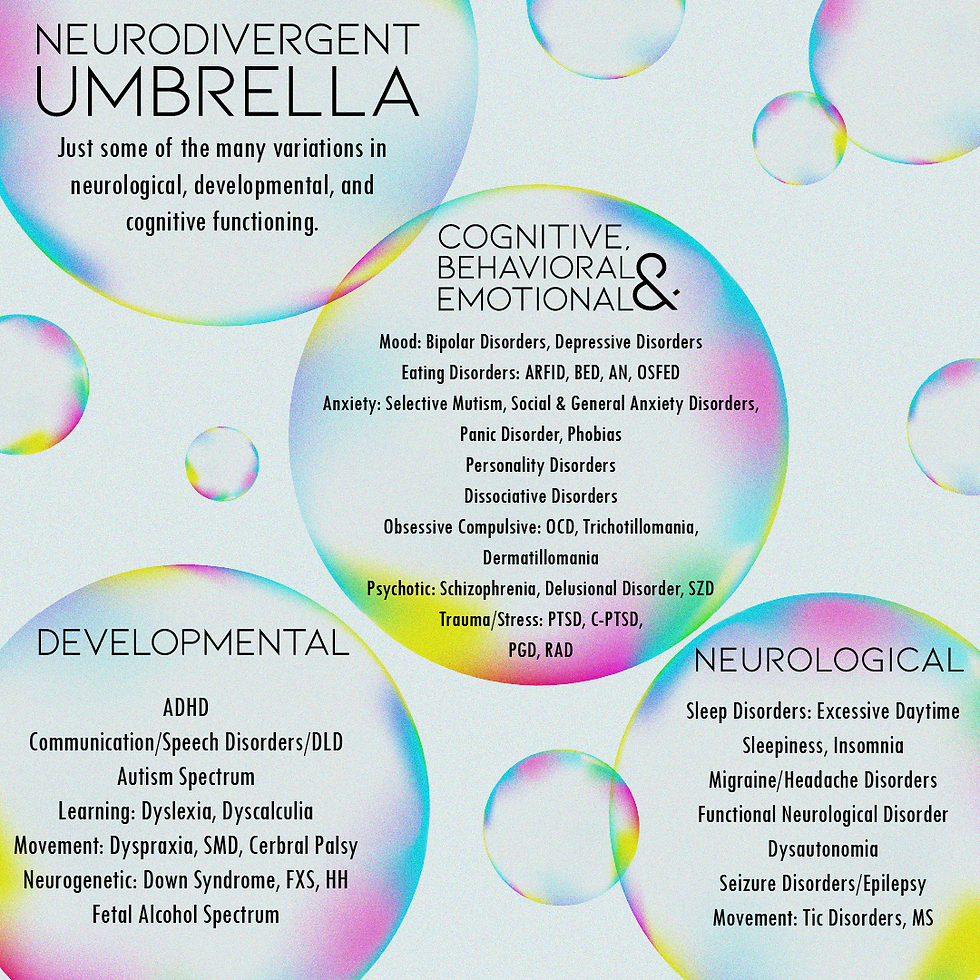What is Neurodiversity?
- Sam Johnson

- Jul 1, 2023
- 3 min read
Updated: Jul 6, 2023
Neurodiversity is a proposed framework that argues there is intrinsic diversity in human brain function and cognition, and that certain things currently classified as neurodevelopmental disorders are differences and disabilities but are not necessarily pathological.
The History of Neurodiversity
The term neurodiversity was coined in a paper presented by Australian sociologist Dr. Judy Singer in 1998. Neuro means relating to the nervous system, and diversity means variety or the state of being diverse. The word put together, simply means there are diverse variations in human cognition, behavior, and neurology.
For the past few decades, the neurodiversity movement has been growing and gaining momentum in the realm of psychology and psychiatry. The purpose of the neurodiversity movement is to destigmatize those with neurodivergent variations and disabilities.
What is Considered Neurodivergent?
The Neurodivergent Umbrella is a phrase to describe all of the neurotypes that are considered neurodivergent. Here's a graphic to help visualize some of the different variations included in neurodiversity.

Neurodevelopmental
When the term Neurodiversity was first introduced, neurodevelopmental conditions were the first to be represented within the term. Many people think neurodiversity just includes Autism Spectrum Disorder and ADHD- but there is so much more.
Neurodevelopmental conditions are variations in human neurology that happen during human developmental stages. Such conditions are:
Autism Spectrum Disorder
ADHD
Communication and Speech Disorders
Developmental Language Disorder
Dyslexia
Dyscalculia
Dyspraxia
Speech Motor Delay
Cerebral Palsy
Down Syndrome
Fragile X Syndrome
Hypogonadotropic hypogonadism (HH)
Fetal Alcohol Spectrum
Deaf/Hard of Hearing
Vision Impairments
Neurological
Another category underneath the Neurodivergent Umbrella is Neurological disorders. Neurological disorders can happen to anyone, at any time. Neurological disorders (NDs) are heterogeneous diseases that affect the body’s autonomic, peripheral, and central nervous systems. The non-communicable neurological disorders include migraines, non-migraine headaches, multiple sclerosis, Alzheimer’s disease and other dementias, Parkinson’s disease, epilepsy, and other neurological disorders.
Regionwide in 2019, neurological disorders account for 8.2 million years lived with a disability (PAHO).
Here's a short list of neurological conditions that are considered neurodivergent:
Sleep Disorders
Tic Disorders
Tourette's Syndrome
Migraine/Headache Disorders
Functional Neurological Disorder
Dysautonomia
Seizure Disorders
Epilepsy
Multiple Sclerosis
Cognitive, Behavioral, And Emotional (Mental Health)
Mental health conditions are also categorized under the Neurodivergent Umbrella for several reasons.
Individuals with neurodevelopmental disabilities are at high risk of co-occurring mental health conditions.
Psychiatric disorders are common in many neurological disorders, including epilepsy, migraine, Alzheimer's disease, Parkinson's disease, essential tremor, and stroke.
Many mental health disorders are still extremely stigmatized and have little to no research for many demographics across the world.
There are 8 categories of psychiatric disabilities:
Anxiety Disorders
Obsessive Compulsive Disorders
Mood Disorders
Trauma/Stress Disorders
Personality Disorders
Eating Disorders
Dissociative Disorders
Psychosis/Psychotic Disorders
Every disorder under these categories is considered neurodivergent because they are diverse variations in human cognitive, behavioral, and emotional well-being. Many of these conditions have treatment options to improve individuals' quality of life.
It is very common for individuals to have more than one psychiatric, neurological, or neurodevelopmental variation. This is called comorbidity.
Studies on comorbidity have found strong relationships between comorbidity and higher rates of suicide, suicidal ideation, greater symptom severity, and poorer quality of life and social support.
As many as 45% of patients meet the criteria for more than one disorder in the course of a year.
Why does Neurodiversity Matter?
Only 16.5% of individuals with depression worldwide seek help, and stigma around mental health is one of the primary reasons.
In a study from 2018 that surveyed over a thousand participants, more than 30% held the stigmatizing belief that a weak personality causes depression.
Research clearly shows that even young children with mental health or neurodevelopmental disorders are stigmatized by the general public with stereotypes including dangerousness and blame. This is especially true for individuals of color.
Neurodiversity allows for a growth paradigm to replace the deficit-focused paradigm.
This movement allows for higher achievements in education, a decrease in societal stigma and bullying, and self-empowerment for those that are neurodiverse.
Follow me on Instagram for more information on neurodiversity, and to learn about my own experiences as a neurodiverse person.




コメント